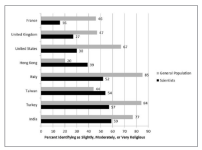And there are rapists who are scientists. Does that make rape scientifically valid? His argument had no science in it. I don't mean his science was bad, but rather there was nothing even attempting to be science in his argument. He made a logical argument that rested upon implausible premises that he merely assumed without any justification. And it turns out his premises logically require that one view God as a petulant insecure child who punishes people simply for applying the most unique trait he created them with.
I bet there are a LOT of religious scientists in India and Indonesia. (Tens of Millions)
Would there be a million atheist scientists in the UK?
First, Hinduism is a polytheistic religion, which means it does not suffer from as many logical absurdities and internal contradictions as monotheism does. For example, polytheism does not have to accept the absurd self contradicting notion that a single God who is omniscient and omnipotent and knowingly created the world to be exactly what it was and is, but also loves us. Hinduism also doesn't share the pathetically obvious self-serving egocentrism of Abrahamic monotheism which puts Earth and humans and then center of the Universe and God's concerns.
IOW, while polytheism and Hinduism still require some rather baseless beliefs, they require significantly less suppression of logic, rational thought, science, and and is required to maintain polytheism than monotheism. And most forms of Buddhism are not theistic at all. Also, b/c those polytheistic religions do not push theism itself of the main point of the religion, there are many who practice and identify with those "religions" without believing in God.
Second, non-theism is the norm among scientists in India. Only 29% of Indian scientists say that they "believe in God".
The countries where you'll find the most "theist" scientists are those where you can get jailed or killed if you don't pretend you are still a theists (e.g., Muslim controlled countries).
If you added up all the religious scientists in the world and compare with the total number of atheist scientists, I'm sure the ratio would be about the same as for the general population.
The facts show your are definitively wrong. Scientists are consistently less theistic and less religious compared to the general population in their countries. Although the difference is stronger in some countries than others, if you add them all together, being a theist would still be far less common among all the world's scientists than the world's gen pop.
And one doesn't need to reach the level of being a scientists to realize the intellectual absurdity of theism and religious claims. Consistently, as amount of education increases, theism and religiosity decrease. High school grads are less religious than dropouts, college grads less religious than High school grads, and graduate students are less religious than undergrads.
And the strong relationship between being less ignorant and being less religious holds when you compare between societies. The least educated societies tend to be the more religious, and the most educated tend to be the least religious. This map shows that the countries with the highest % of people who feel that "religion plays an important role in their daily life" are in Africa, Middle East, and southeast Asia. Predictably,
these are the same countries with the lowest average number of years of educations (around 5-6 years).
South America is slightly less but still rather religious, and predictably those countries have slightly more but still rather low levels of education (about 7.5 years). The South American country with the most education (9.7 years) is Argentina who unsurprisingly is also one of least religious on that continent.
North America, Northern Europe, and Russia are the lowest in religion and the highest in education (10-13 years).
And the most religious outlier in Europe, Romania which is the only European country where more than 80% view religion as important, it is also one of the only countries in Europe with less than 10 years of average education, another being Portugal which is also more religious than most of Europe.
{Darker blue = higher % of people saying "religion is important"}
So, no matter how you slice it, being more educated and less ignorant is a strong predictor of both individuals and societies becoming less religious and theistic. If course that isn't a guarantee without exceptions, b/c knowledge and intellect are merely tools that applied will lead to atheism. People can and do choose not to honestly apply those tools to the issue of God, and that is how you wind up with theistic scientists. We have theistic scientists for the same reason we have 7.5 foot tall people who have never dunked a basketball, b/c they have never bothered to even try to apply that tool to that domain.


